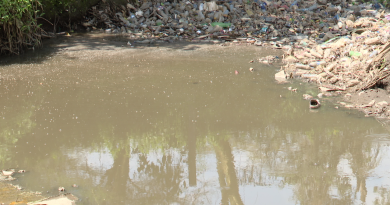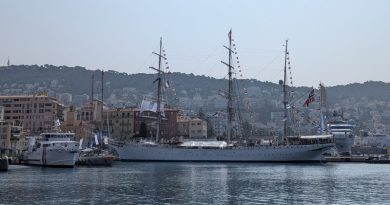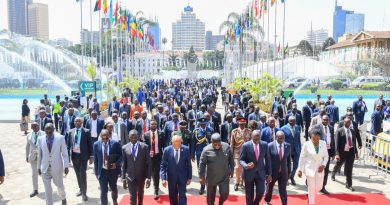Ocean of opportunities: Breaking the Barriers in African Ocean Conservation
By Carolyne Tomno
Along the breath-taking turquoise shores of the Indian Ocean, where the waves kiss the sandy beaches, marine conservationist Mohdar Mohammed discovered an unexpected treasure in seaweed. Once dismissed as marine debris, this oceanic resource is now at the heart of an agricultural revolution in Kenya, aligning with the global movement toward sustainable blue economies and marine biodiversity conservation.

For years, beach clean-ups resulted in piles of discarded seaweed, which were often burned, contributing to environmental degradation. According to Mohammed, he saw potential where others saw waste. His journey of discovery took him across the world, from the bustling innovation hubs of Singapore and China to the rich agricultural traditions of Ireland. What he learned was transformative, “For centuries, coastal communities have used seaweed as a natural plant booster, long before synthetic fertilizers took centre stage”. Reveals Mohammed

Mohammed founded Morganics Seaweed Organic Fertilizer, one of Kenya’s first companies dedicated to harnessing marine resources sustainably. His Production process emphasizes environmental responsibility, ensuring that all seaweed used is ethically collected from the shore rather than harvested from the ocean, preserving marine biodiversity. “I work closely with the Kenya Wildlife Service, to ensure that this initiative supports ocean conservation while creating economic opportunities for local communities.

From sea weed to Fertilizer
The transformation of seaweed into fertilizer follows a sustainable and low-impact process. After being carefully cleaned to remove excess salt, sand, and debris, the seaweed is chopped, weighed, and placed in water-filled containers in a controlled environment. Through natural decomposition or fermentation, it breaks down into a nutrient-rich liquid or slurry.

The result is a highly effective organic foliar and soil fertilizer enriched with essential minerals that promote stronger, healthier crops which is a crucial step in enhancing food security while combating soil degradation in a climate-stressed world.
Climate Resilience
With a current production capacity of 10,000 liters per month, Morganics Seaweed Organic Fertilizer is gaining popularity among flower farmers and organic growers seeking sustainable solutions. “Unlike conventional organic fertilizers, seaweed-based fertilizers offer a unique spectrum of nutrients that enhance plant resilience and growth,” Mohammed explains. As global demand for sustainable agricultural inputs grows, his work is fostering climate resilience and reducing reliance on chemical-based farming.
Socio-Economic Impact
Beyond business, Mohammed is deeply committed to fostering social impact. He envisions empowering local coastal communities, particularly women and youth groups, to engage in seaweed collection and processing.
By creating jobs and promoting sustainable resource management, his initiative embodies the conference’s vision of a thriving blue economy that benefits both people and the planet.
Mohdar Mohammed is not just manufacturing fertilizer; he is pioneering a sustainable agricultural future for Kenya and beyond.
As he leads the way in seaweed-based organic farming, he hopes to inspire a new generation of eco-conscious entrepreneurs who recognize the value of marine resources without compromising the health of oceans.
Challenges
Even as he plans to work with women and youth groups the biggest challenge facing the sector is that most of the women and youth cannot swim or dive in the ocean. But still, his work stands as a testament to the power of innovative, nature-based solutions in securing a greener, more resilient future for all.
Sea Weed cultivation in Tanzania
In Tanzania, Sea weed cultivation employs 30,000 farmers, 80 percent of whom are women. This is according to Flower Msuya, a researcher at the Zanzibar Sea weed cluster initiative who was Speaking during the workshop for the blue and Circular economy for Journalists held in Zanzibar.

Challenges of Climate Change
Msuya adds that challenges associated with climate change and rising temperatures and environmental shifts is forcing seaweed to grow in deeper Ocean waters, making traditional farming methods ineffective.”

It is becoming difficult for the women to farm sea weed, Some of the farmers have already given up while some go for several months without harvesting anything”. Says Msuya. The biggest hurdle facing the women is that most of them cannot swim or dive.
But there is hope in women like Nancy Iraba, a marine biologist and the co-founder of Aqua Farms Organization, who is at the forefront of transforming ocean accessibility in Tanzania.
Breaking barriers and providing solutions
Nancy Iraba is changing the tide. As Tanzania’s first female dive master, capable of diving up to 40 meters, she has broken significant barriers in marine conservation and exploration.
While her certification as a dive master was a personal achievement, it has become a movement to reshape opportunities for Tanzanians, especially women, in ocean-based industries. “None of us had experienced life below water until I was selected to be part of the NEWF program in 2017“says Nancy

With the Understanding that diving and swimming skills are essential for women seaweed farmers to access deeper waters, Nancy has initiated training programs through her organization. She established ,Tanzania Dive Labs, where she has trained and certified 40 scuba divers, including a growing number of women.
And today, the program boasts of six dive masters and two instructors, with a mission to train Tanzania’s first female diving instructor.
By equipping local communities with essential diving skills, Nancy is empowering the women to safely cultivate high-quality seaweed in deeper waters, increasing their yield and income. According to Nancy, Ocean exploration programs are already attracting youth to take up sea weed farming. “Being able to swim and dive in the ocean it will lead to the production better quality sea weed and better pay”. Adds Nancy
She is also working in collaboration with fishermen who have been trained and certified as a dive masters and have in turn became marine conservationists. The Fishermen are equipped with an underwater camera which, monitors coral farms and the marine environment, providing crucial data to support sustainable seaweed farming.

Nancy’s impact extends beyond diving and seaweed farming. She also launched the Africa Re-Focus Project, advocating for the intersection of ocean accessibility and the blue economy.
She has introduced ocean exploration initiatives to inspire young people to consider careers in marine industries. Her work has not only improved the livelihoods of seaweed farmers but also paved the way for a new generation of Tanzanian ocean stewards.
Importance of local communities in conservation and Blue economy
From Cameroon, Aristide Takaoukam Kamla, is a marine biologist whose career journey is as unique as the marine creatures he works to protect. He grew up in a rural community where water was considered a domain of evil spirits rather than a life-giving force. Aristide’s path to marine biology seemed improbable.
Myths and cultural barriers
His mother feared for his safety when he expressed an interest in swimming, a practice she believed would invite harm. Water, for his community, was useful only for drinking. Yet, despite these fears and cultural barriers, Aristide has found his calling in the vast oceans that lie beyond his childhood world.
Aristides journey into marine conservation began unexpectedly. During his master’s studies in Marine biology, he encountered the African Manatee, an endangered species that had long been under threat. And to understand the Manatee and how to protect it, Aristide Had to work with the local fishermen, who had spent their lives navigating and understanding the waters that Aristide had never swum in.
Technology and Innovation
Despite his inability to swim, Aristide learned that the fishermen were not just a source of local knowledge, but were the key to understanding the delicate marine ecosystems. Working with these fishermen, he found a powerful way to combine indigenous knowledge with scientific research.
He has co-created the Siren App, a mobile tool that allows fishermen to document marine life sightings by capturing images and GPS coordinates. This app has become a game-changer for marine conservation.
The data he has collected, includes more than 30,000 documented marine wildlife observations, which has contributed to the creation of the first-ever shark and Ray catalogue of Cameroon.
Citizen Science

The APP also helped uncover the surprising reappearance of the Marbula Ray, a species thought to be extinct for over 40 years, found again in the Gulf of Guinea through the efforts of the fishermen. The impact of this citizen science initiative has been profound. “Fishermen, once seen as mere bystanders, have now become key players in ocean conservation” adds Aristide. Their images of endangered species are now used to promote better conservation policies at national and international levels.
Despite his lack of swimming skills, he made the bold decision to travel to South Africa and learn to dive. This led to the first scientific dive in Cameroon, opening up new opportunities for marine research. In his home country, Aristide founded a diving lab that has already trained eight new divers, creating a crucial team of local experts capable of monitoring the oceans’ depths.
Solutions to challenges and Barriers in Marine conservation
In January 2025 ,”Around Africa Expedition”, a pioneering four-month expedition spearheaded by Ocean X in collaboration with OceanQuest was launched . The expedition, aboard the state-of-the-art research and media vessel, OceanXplorer, is set to push the boundaries of ocean exploration and scientific research along Africa’s coastline.
Exploring Africa’s Oceans
The OceanX and Ocean Quest “Around Africa Expedition” is embarking on a journey to explore the vast, understudied oceans surrounding the African continent. Through cutting-edge research, the expedition will shed light on critical ocean ecosystems, contributing to the understanding of biodiversity, and conservation opportunities essential for sustainable development and local livelihoods.

By leveraging innovative methodologies and technologies, the Expedition aims to provide invaluable insights and guide data-driven decisions to support conservation policy, sustainable resource management, local capacity building and training, and marine protected area planning. “Fostering innovation and creating a lasting knowledge base ensures that this expedition drives meaningful impact,” explained Vincent Pieribone, CEO and Chief Science Officer of OceanX. “This collaboration underscores our collective determination to explore, understand, and conserve the marine environment through a bold move pioneering four-month expedition spearheaded by OceanX in collaboration with OceanQuest. The expedition, aboard the state-of-the-art research and media vessel, OceanXplorer, is set to push the boundaries of ocean exploration and scientific research along Africa’s coastline.
An Expedition of Global Importance
The expedition is traversing destinations such as Gran Canaria, Canary Islands; Mindelo, Cape Verde; Moroni, Comoros; Walters Shoal, Madagascar; Walvis Bay, Namibia; Agulhas Plateau and Cape Town, South Africa;
Fostering international collaboration.
Dr. Martin Visbeck, CEO, OceanQuest, says working with several African and international science networks is connecting regional expertise to ensure that the knowledge and benefits generated by this expedition create lasting impacts, both for the people who depend on these waters and for the global community committed to sustainable deep ocean stewardship.”
NEWF Expands Ocean Access in Africa
And in a ground-breaking effort to reshape Africa’s marine narrative, the Nature, Environment & Wildlife Filmmakers (NEWF) initiative has launched the continent’s largest ocean access program for African scientists, conservationists, and storytellers.

Despite 38 out of 54 African nations boasting a coastline, the ocean remains an underutilized storytelling medium for the continent’s rich biodiversity and conservation efforts.
NEWF is changing that by cultivating a pan-African community of divers who are redefining what it means to be an African marine scientist and storyteller. Hundreds of marine biologists including those at master’s and PHD levels cannot swim, let alone dive, making it impossible for them to access and study underwater marine life .The inability by marine experts to swim meant they cannot get access to go and see what is beneath the surface of the ocean.This is is according to the founders of NEWF Pragna and Noel Kok
Through intensive training, NEWF Fellows have honed specialized skills such as advanced underwater cinematography, photography, and deep-sea exploration via free-diving and rebreathing techniques. The initiative is not just unlocking the ocean’s mysteries but also fueling local economies by empowering the next generation of marine experts and visual storytellers.
This effort is a game-changer for African ocean conservation, giving the continent’s voices the tools to share its underwater wonders with the world
Deep-sea exploration may reveal new seaweed species with valuable commercial applications, such as pharmaceuticals, biofuels, and food production. The mission will increase understanding of ocean circulation, ecosystem health, and marine biodiversity to help address ocean challenges like climate change, sustainable resource management, and conservation.




